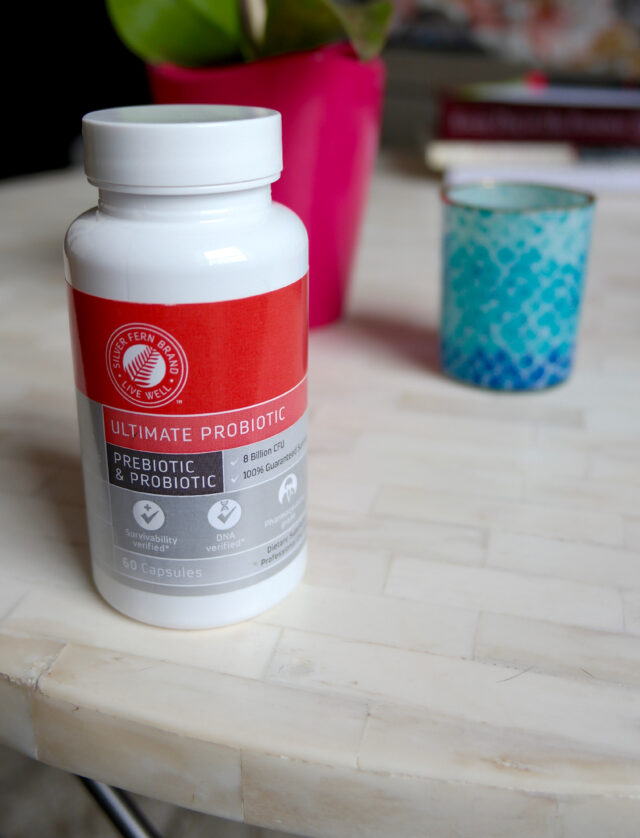

I’ve taken Seed Probiotics for 5 years – here’s what makes it different, how it helped my gut and what happened when I stopped taking it.
A handful of years ago, I was listening to a Rich Roll podcast about a probiotics company named Seed. I’ve been taking probiotics for years, but have always blindly shopped and brand hopped, never really sure if I was getting a “good” probiotic. After listening to the podcast, I immediately signed up for Seed monthly shipments. What struck me the most is how much research and data they have around their specific probiotic strains, something lacking with other brands.
I first started taking probiotics about 7 years ago but never exactly knew how to buy a “good” one. So I’d go to the probiotics section at Whole Foods and buy whatever sounded like it had the “most” strains. Or, whatever was expensive. Or whatever happened to be on sale. Not exactly the most scientific approach, ha!
After learning more about Seed, I switched and haven’t gone back to any others. In fact, I’ve taken Seed probiotics for about 4 years now. I take two capsules a day on an empty stomach, so usually right as I wake up. So when someone asked, “is Seed Probiotic actually good?” I always say yes. It has been SO good, in my experience.
Sorry, perhaps TMI but poop is super important y’all! And as someone who has struggled with digestive issues for over 20 years, this is a HUGE win in my book. Over time, things have improved even more. Seed can’t treat or cure any disease, but it’s certainly helped my irritable bowel, which is amazing.
After about a year, I stopped taking Seed because we moved (long story, but in short, we moved out of our old house and moved into our mountain condo while our new house was being finished) and I wasn’t sure where to ship my subscription since timing was so up in the air so I just cancelled it.
After just a couple weeks without it, I noticed that I had more gas, was more constipated and when I was able to go to the bathroom, I had loose stools. So, I quickly signed back up for Seed and just dealt with all the address woes. Within a few weeks, things were back to normal.

Yes. The Daily Synbiotic is a 2-in-1 capsule. It contains probiotic strains that deliver benefits to the gastrointestinal system which influences overall health.
he science is complex, but essentially, most of the bacteria we carry around actually helps keep our bodies healthy. We’ve been told so much that we need to sanitize, bleach, and get germs off of everything. And yes, it’s wise to wash your hands and clean surfaces.
But, there are also many good strains of bacteria. Good bacteria help foster a healthy gut, microbiome, digestive system and immune system. And that’s where probiotics come into play.
Basically, metabolites are like bacterial poop: the end product of what they metabolize. As bacteria do what they need to sustain themselves (e.g. their version of “eating”) they take bigger compounds and turn them into smaller compounds. So metabolites are simply small molecules and naturally formed as substances are broken down.
The Seed Probiotics Daily Synbiotic formula was developed by the Seed team in conjunction with scientists and doctors who are experts in the field of probiotics. Their Chief Scientist is Dr Gregor Reid, Ph.D., a world-renowned specialist in beneficial microbes. He serves as the Chair of the United Nations World Health Organization Expert Panel on Probiotics. And he led the group that authored the globally accepted definition of ‘probiotics’. Additionally, Seed has a Scientific Advisory Board, made up of male and female MDs and Ph.Ds. All of that to say, these are experts with serious backgrounds.
If you really want to dive deep into probiotics and the science behind them, read about Seed’s approach here.
A Synbiotic is defined as a “combination of prebiotics and probiotics that together, promote gastrointestinal health by improving survival and adherence of live microbial dietary supplements”. In simpler terms, the idea behind synbiotics is that adding prebiotics to a probiotic supplement can help ensure the digestion-friendly microorganisms arrive in the gut alive and well.
The 2-in-1 probiotic capsule technology is resistant to stomach acid, digestive enzymes, and bile salts. In addition, it has a Chlorophyllin exterior to protect the strains from light. And the powder prebiotic suspension helps protect it from oxygen, moisture, and heat (all of which bacteria are sensitive to).

Note: all of this information comes directly from Seed. I shared my personal experience above.
Seed probiotics also support skin health.
Seed ds-01 daily synbiotic is made up of different probiotic blends to support different functions in the body:
The other ingredients included are:
Seed is a vegan, gluten-free, and dairy-free probiotic and doesn’t contain soy, binders, or preservatives. It’s also free of the 14 classes of allergens identified by the European Food and Safety Authority (EFSA) Panel on Dietetic Products, Nutrition, and Allergies.
Note: A few years ago (May 2020), they made a minor update to the prebiotic blend in the Daily Synbiotic. Scandinavian chaga and pine bark were removed to allow for a higher dose of the primary prebiotic, punicalagin. I didn’t notice a difference at all in how my gut felt after that change.
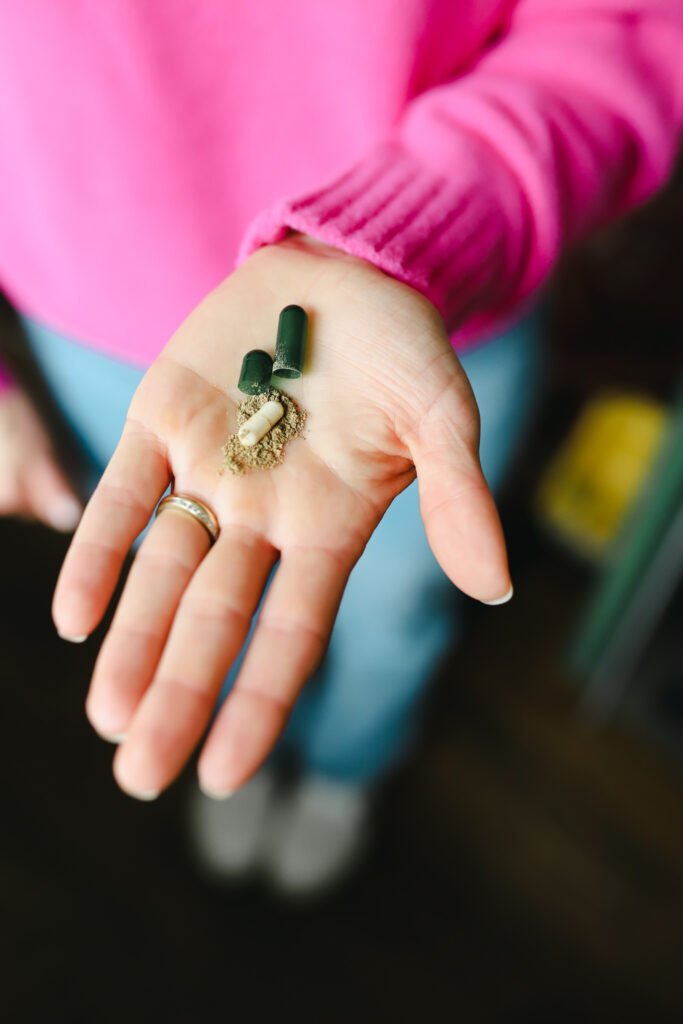
Most people notice benefits (less bloating or more frequent bowel movements) within about 24-48 hours, since it has localized benefits. Some of the other benefits will take longer to “notice” and you may not notice any changes at all in terms of the benefits for cardiovascular health.
While I didn’t experience any negative side effects when I started taking Seed, some people have noted that they had some bloating, increased gas, loose stool, and headaches when they first started taking Seed. Typically, those things resolved after a short period, but it’s worth noting in case you experience the same thing.
You can only buy Seed probiotics online, but that’s a major perk for me. I like that the probiotics ship to me monthly so I don’t have to think to re-order. And I like their approach to sustainability, where they send refills for a green glass jar rather than entirely new containers each month. All of the packaging is compostable. It’s actually really cool – some of their packaging is made from mushrooms. Oh, and it’s completely shelf stable, so you don’t have to worry about that.
Your initial order comes in a box with with a glass jar to hold your monthly refills. They also include a travel jar, which I love! While your order only includes a one months supply, they are shelf-stable for 18 months at temperatures up to 78 degrees.
A little pricey, yes, but to me, your gut health far out ways a Starbucks coffee run. Since you purchase Seed as a monthly subscription, it’s also great to note that you can skip a month or cancel altogether at any time. I highly doubt you’ll want to, but if you do, it’s not an issue at all!
Oh, and shipping is free!
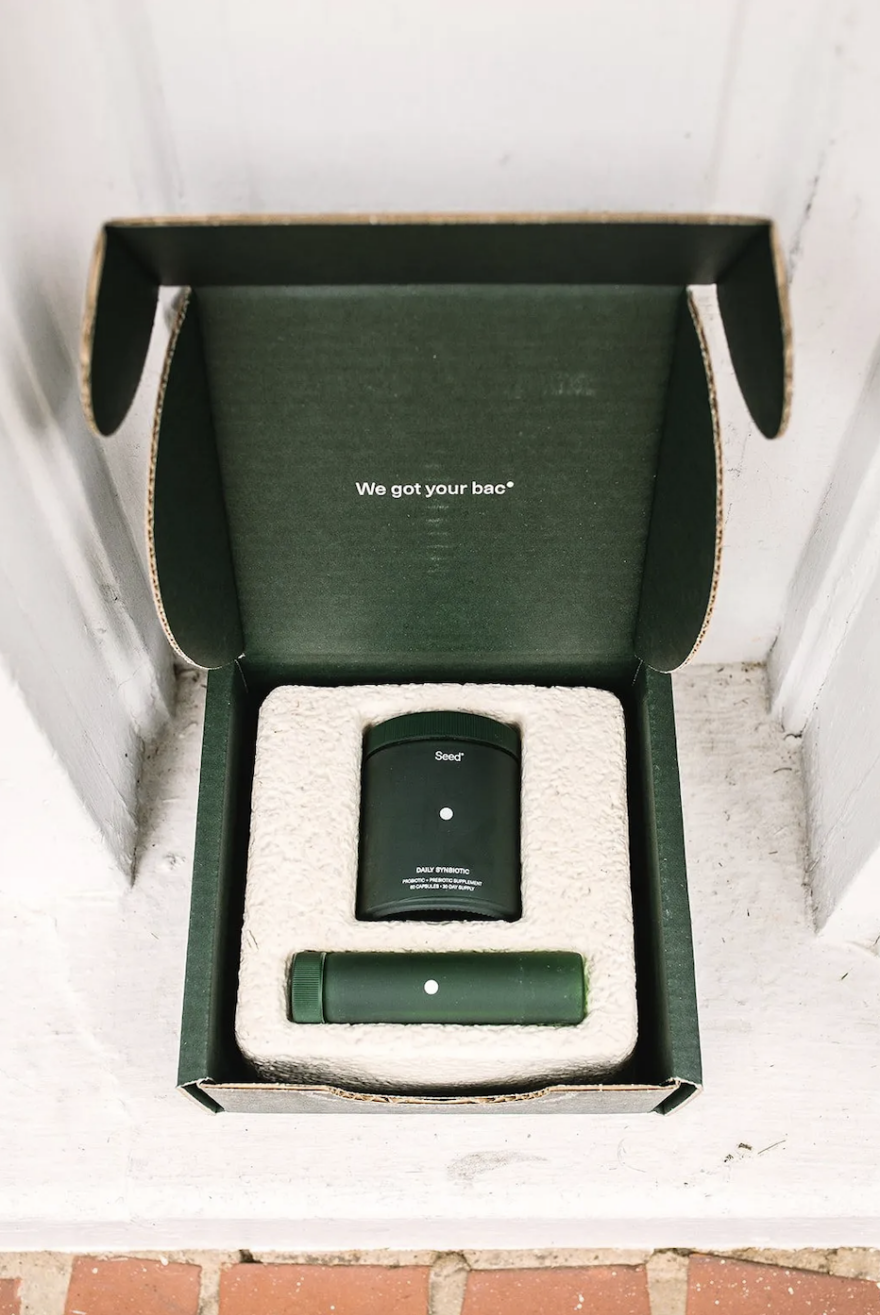

And then you just dump the refills into your jar! They come in a 30-day supply.
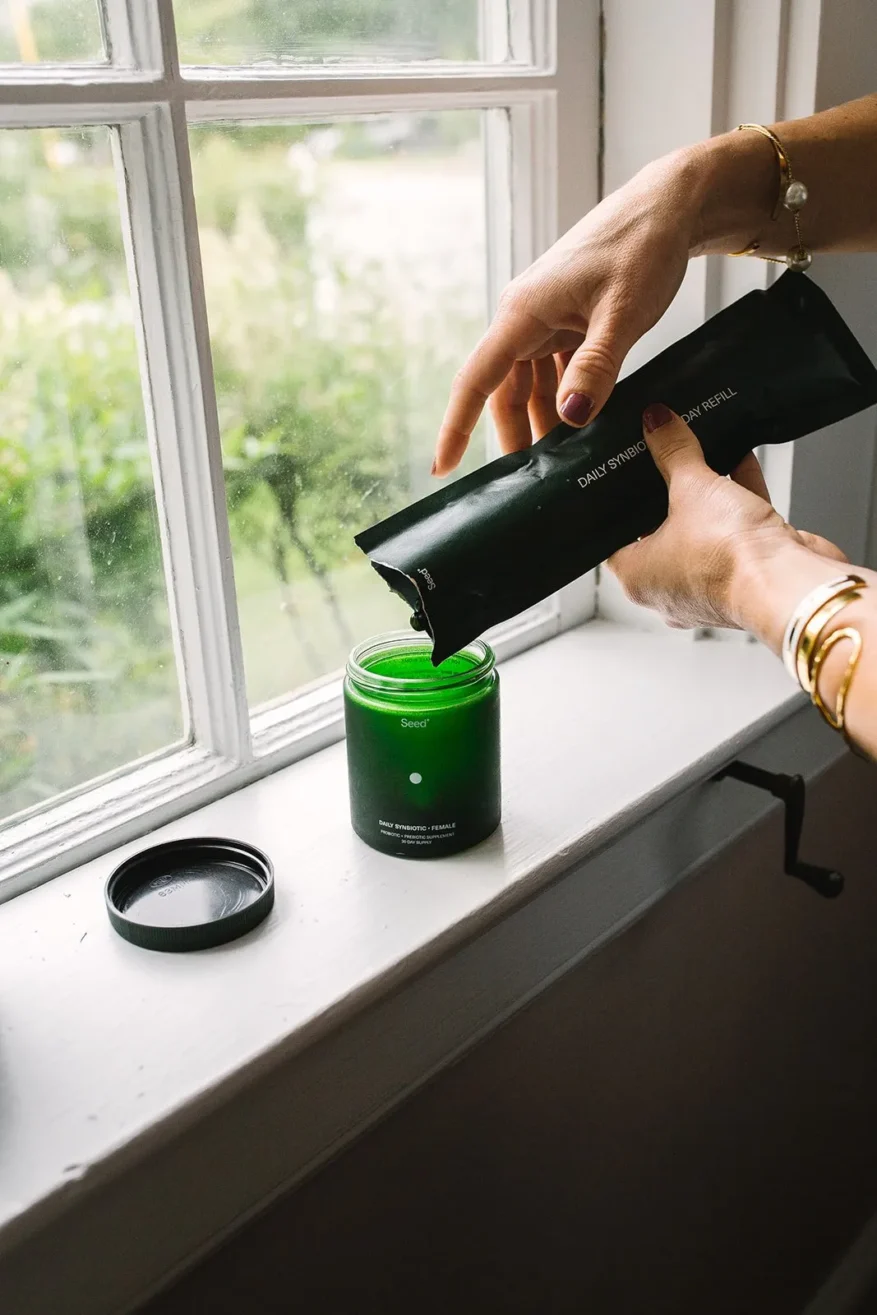

You can only buy Seed from Seed.com. They are only available as a monthly subscription, which provides a 30 day supply each month. The shipping is free, which is a great bonus.
The FDA actually recently authorized an Investigational New Drug (IND) application for DS-01™ (the Daily Synbiotic). This is an important milestone because it grants permission to begin clinical trials to investigate the safety and efficacy of a drug, food, or dietary supplement.
Fun fact, Seed actually has a Prebiotic made specifically for kids! The PDS-08® Pediatric Daily Synbiotic for Kids + Teens is great for ages 3-17. Thomas hasn’t tried this yet, so I don’t have a personal experience to share, but if your child struggles with digestive woes and tummy aches, you may want to read into Seed’s Kid’s Prebiotic.
I took Seed during both of my pregnancies (and while breastfeeding), but always check with your doctor abougt your particular situation.
Fun company fact: Seed Co-Founders Ara Katz and Raja Dhir were introduced when Ara was pregnant. Her journey through pregnancy and breastfeeding is part of what inspired their vision for Seed.
You can purchase Seed here. Use promo code TERI to get 15% off your first month.
All opinions are my own and I do receive an affiliate commission if you purchase Seed through my links. Before I was approved an affiliate, I completed an educational course on the science behind their probiotics. Also, I spent my own money buying Seed long before I applied to become an affiliate.
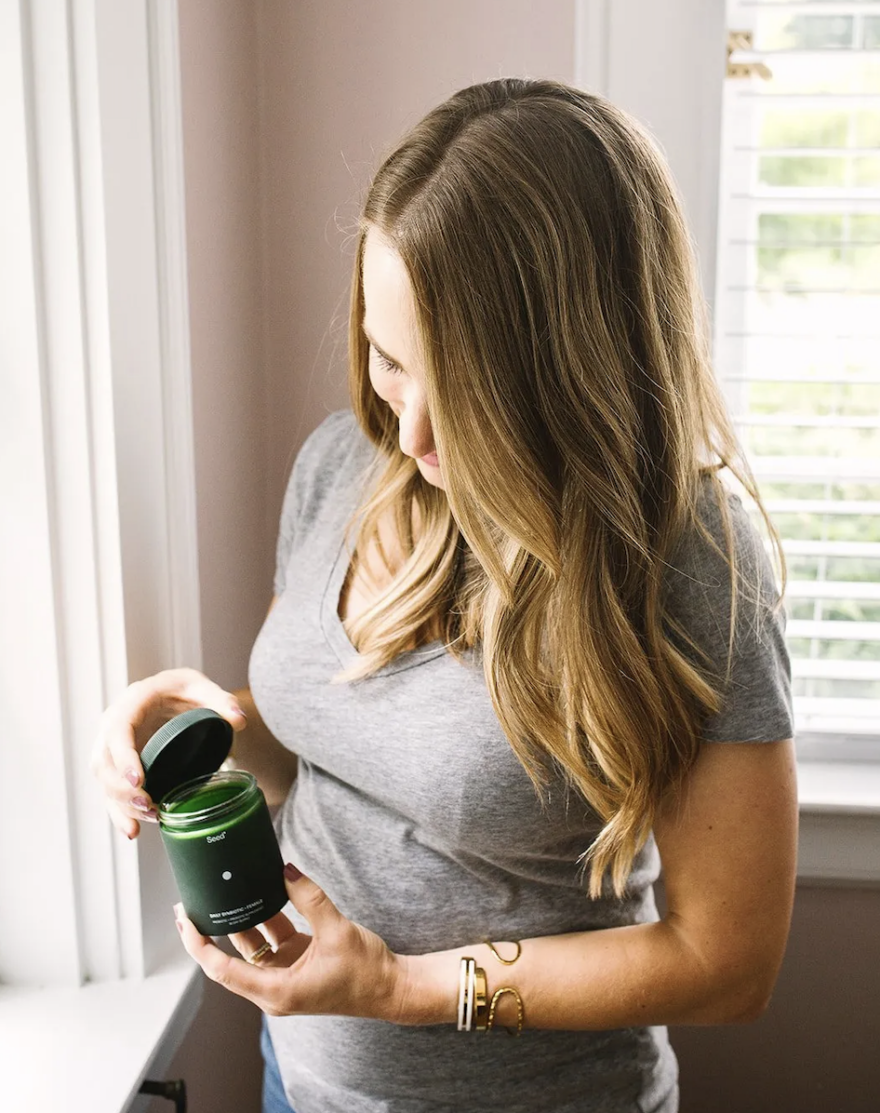

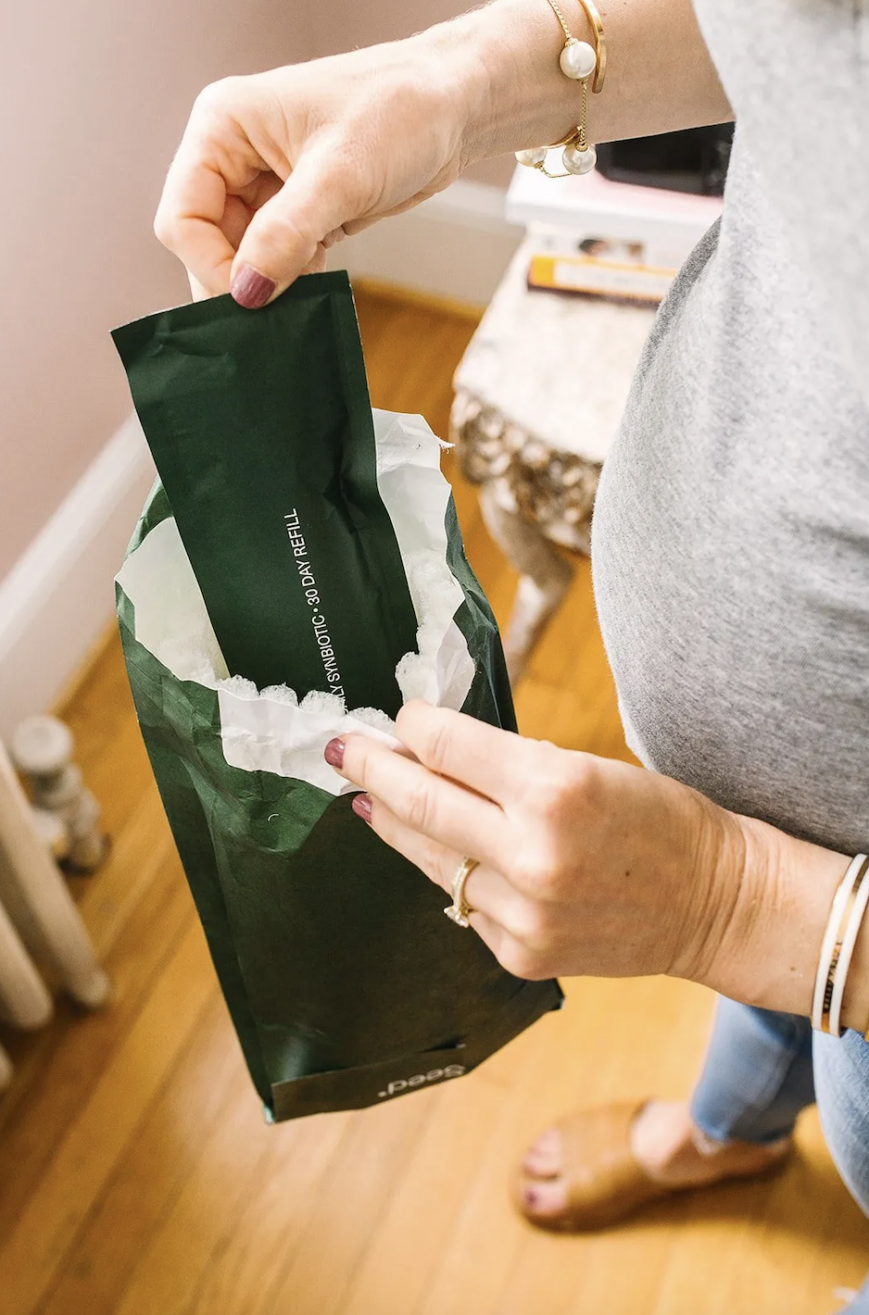


Leave a Comment
25 responses to “My Honest Seed Probiotic Review (NOT SPONSORED)”
Hi Teri! Thanks for the review. Super informative. Do you take on an empty stomach in the morning before or after a work out (if applicable)? Want to avoid any surprises 🙂
I typically take it about an hour before lunch!
Do you have to take two capsules a day? If you do, do you start with one and work up? Would one work for some people?
The recommended dose is three of each capsule. I don’t think you need to work up from one to three, but you could certainly try just one of each and see how you feel. Better than nothing!!
Each capsule? I thought it was one capsule, prebiotics on outer shell, probiotics on inside… I didn’t see in the description that it would be more that one specific capsule…
Oh my gosh, I’m so sorry!!! I was thinking of my Balance of Nature supplements!!
Yes, with the Seed probiotics, start with one and then work up to two!! I have mom brain and am majorly sleep deprived. So sorry!!
No worries! Thank you for replying. I did just recieve an email from Seed, telling me to start with one and work up.
I totally understand. I did use your discount code.
Great! I hope you like them!!
Just used your promo code! Excited to finally try Seed!
Great!! Hope you love it as much as I do!
Thanks for the review, Teri! I just used your promo code to save on my first month!
yay! Keep me posted on what you think! Tommy and I both take them!
Teri, do you experience intestinal cramping with Seed? Seems when I take Seed around 6:30AM I wake up around 4:00AM the next morning with intestinal cramping and loose stools. Not sure if it’s the cause or something else is going on.
I didn’t experience that. It may be your body adjusting a bit (it can cause some digestional upset) so perhaps back off to just one pill for a bit and see how that goes. I bet you could also contact them for advice!
My first order of Seed did not contain the ViaCap™—a 2-in-1 capsule delivery technology. I opened the green prebiotic outer capsule on a few of mind and it was just the powder inside. Very disappointing. Not sure I will be using them or getting anymore.
Oh interesting!! Did you reach out to them to ask about it?
I am curious why the title of this article says you stopped taking it? Unless I totally missed that part, it says you love it and still use it. Was that just click bait to get me to read or did you actually stop taking it and have a noticeable difference?
Ah, I’m so glad you commented with such helpful feedback! I just realized that I had drafted that update but hadn’t actually published it! I just hit publish on it. Definitely not clickbait – that’s not how I run my business.
Hi,
I took Seed for about two weeks, at which point I had to stop. My BM basically quit completely and I begin to experience much pain in my lower back and upper neck with breakouts and great fatigue. Some say that you would get worse before you get better but I could not function digestively at all. When I stopped, over a period of a few days I begin to feel much better. I don’t know if this was from this particular probiotic but it sure seemed like that as I had done nothing else new. Maybe I am an odd case… but for me, it made me ill. You don’t have to publish this, but I surely hope no one else has the experience I had.
That’s odd! Did you reach out to them? I’d be curious to see what they say.
I don’t think every supplement will work for every person — we are all so different! — but this is the first bad experience I’ve ever heard of!
Hi,
I know that on previous posts you’ve spoken about anxiety. Have you noticed if Seed has helped with that at all? I’ve read about how gut health is so important and how an unhealthy gut could cause anxiety to worsen.
Thank you!!
Angela
Hmmm it’s hard to say since I’ve been on it so long but I do think my anxiety has improved over time! But there are lots of things I’ve done to work on that.
I would like to use this product but I am 83 years old with serious swallowing issues and the capsule is much too large for me to swallow. Do you have any way for me to deal with this problem?
I am unlucky, I guess, because when I started taking seed my stomach always felt bloated to the max and then two weeks in I got nauseated and had diarrhea something fierce. I had gas indigestion and a multitude of things but I also have ibs and my gallbladder was removed years ago so maybe it’s because of these things?
Hard to say! I hate they didn’t work for you! Probiotics are so individual and what works for some may not work for others.